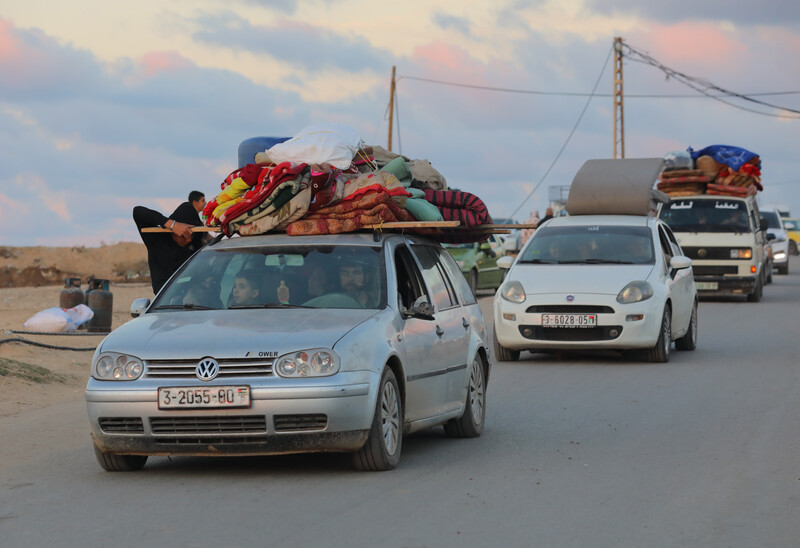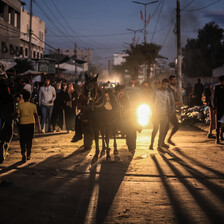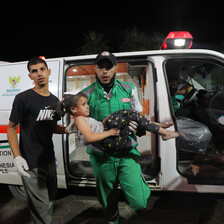The Electronic Intifada 5 January 2024

People in Gaza have no option than to flee their homes.
APA imagesMy biggest fear in this war has been that we would have to flee our family’s home. This nightmare has now become a reality.
Based on the grid map which Israel’s army published in December, our block – in the southern half of Gaza – is now considered a combat zone.
When Israeli tanks got very close to our house, we realized that we couldn’t risk our lives by staying put. So we took the incredibly difficult decision of fleeing to Rafah, Gaza’s southernmost city.
Why was this decision a hard one to make?
I’ve always been someone who is attached to the smallest details of my life. I love my possessions just like I love the people in my life.
My bed wasn’t only a place to sleep on. It was the place that stored all the plans I made and aspirations I set before I fell asleep.
It was the place where my dreams occurred.
My pillow bore witness to all my feelings. Happiness, sadness, anger, calmness.
All the feelings that no one got but my pillow.
My desk holds my memories of studying in dentistry college for five years.
All the books I read. All the mugs of coffee I drank to keep me up all night and finish my studies.
All the exams I prepared for.
That’s why I love my desk.
My wardrobe contained my beautiful clothes. Everything I bought to wear was carefully arranged.
Every garment means a lot to me.
These things aren’t only materialistic. They have mental and emotional value for me.
Why wasn’t the bag that I packed able to take everything in my room?
I want to live
In a crisis, basic necessities have to be shared between a large number of people.
How would I share a bathroom with many others? How would I deal with this massive unprecedented change?
For a moment, I considered staying at home no matter what. But I do love life and I want to live it to the fullest.
I want to be a witness to the end of this genocide, not a casualty. I’m still in my mid-twenties and there’s so much to give to this world.
Once we left our home, we were shocked by the size of the crowds. People fleeing from various parts of Gaza were filling up the streets.
Normally it would take 30 minutes to drive from our house to Rafah.
There were no police managing the traffic and that added to the sense of chaos.
It took us four hours to reach the mid-way point of our journey.
We only had a small amount of petrol for our car and we were worried that we would run out and be stuck in the middle of the road.
My brother suggested that we return home and take a different route for Rafah.
That was risky. But the road was empty.
Life and death matter
The alternative route had been bombarded many times in the earlier stages of this war. We were worried that it could be attacked again while we were on the road.
What choice did we have?
There was a chance that we could get targeted. There was also a chance that we wouldn’t be and that we would reach Rafah.
Making it to Rafah from the other road – the one we had taken in the beginning – seemed impossible.
It was literally a life and death matter.
For a minute, we went silent. Then I told my father that we would have to give it a go.
My brother and I insisted, leaving our dad with no other option.
So we took the dangerous route.
It was completely empty.
I observed the sky closely. My fingers were frozen.
My dad’s face turned pale as he drove.
My brother never stopped praying throughout the journey.
Eventually, we arrived.
We arrived safely in Rafah. We survived.
For the two nights following that scary trip, I couldn’t sleep.
I am trying my best to get over what has happened, to move on in the hope I will be able to adapt in the new circumstances.
I hope that I will be one of those who live to tell the story, not someone whose story gets told.
Vicious circle
One aspect of our crisis is that there has been a surge in prices. Many things now cost several times more than they did a few weeks previously.
Prices started increasing at the beginning of this war. They are now skyrocketing.
Almost nobody is able to pay these prices. Middle income people and the poor are all affected.
A bag of pasta which would have previously cost a little over $1.30 now sells for $5.50.
Getting through the day is tough.
As huge numbers of people have lost their jobs, we are talking about an increase in prices and poverty at the same time.
After many weeks of nothing entering Gaza, some humanitarian aid is getting in. It’s very little compared to what people need.
Some aid recipients have ended up selling part of it in order to get cash so that they can buy other things they need. Things that are not provided in the aid parcels.
People not receiving aid parcels are thereby forced to buy canned food from aid recipients.
It is a vicious circle.
You sell aid so that you can buy something else. I buy what I need from you.
I recently walked down to a small market and stood in front of a shelf that contained biscuits.
I hadn’t eaten biscuits in more than two months and couldn’t believe that I finally saw some.
A child walked in and offered 30 cents. That was the price before the war.
The man at the market declined her offer, telling her the biscuits now cost $1.30.
The child was about to leave, when I took her hands in mine.
I bought a biscuit for her and one for me.
Will there be anyone there to buy her biscuits the next time?
Alaa Abu Shammala is a dentist in Gaza.





